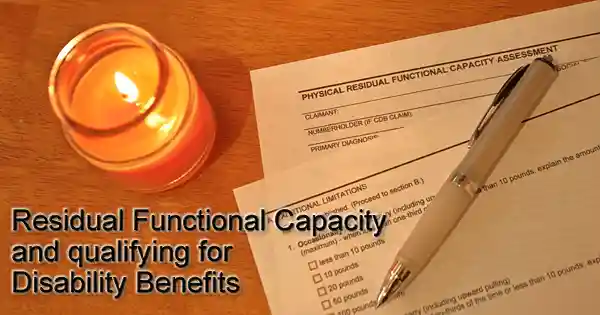Residual Functional Capacity and qualifying for Social Security Disability Benefits
Your Residual Functional Capacity (RFC) and qualifying with the SSA for Disability Benefits
Author Attorney Lloyd Bemis:
Your disability and its related symptoms can limit your physical and mental abilities in the workplace. Residual Functional Capacity is the term the Social Security Administration uses to identify how a disabled person’s current limitations prevent them from meeting the physical, mental and sensory requirements of the workplace.

Residual Functional Capacity is the term the SSA uses to identify how a disabled person’s current limitations prevent them from working. You may qualify for disability benefits. Call 512-454-4000 For help today!
Who Determines Whether I Am Disabled?
The Social Security Administration is the government agency that determines whether or not you are disabled. The SSA only gives disability benefits to people who are unable to work due to a disabling medical condition that is expected to last at least one year or will result in death. When reviewing your application, the Social Security Administration makes sure you meet the basic requirements for disability benefits. They will determine whether you have worked long years to qualify for benefits, and whether you are currently able to work. Once the Social Security Administration determines you meet the basic criteria for benefits, they send your application to the Disability Determination Services office in your state.
The state’s office completes the process of determining your disability.
These state offices will review your medical records, speak with your healthcare professionals about your treatment, and review your ability to do work. When reviewing your ability to work, the state offices determine to what extent you can walk, sit, lift, carry and remember instructions. It is important to remember that your doctors, surgeons, or other healthcare providers do not determine whether you are disabled. Your providers only give and discuss your medical history and records with the Disability Determination Services office. The Disability Determination Services office makes the final decision about whether you are considered disabled.
The SSA assesses Residual Functional Capacity based on all relevant medical and other evidence in a person’s case record.
You must provide the information the SSA uses to determine your residual functional capacity, but before the SSA can make a determination the agency is responsible for “developing your complete medical history, including arranging for a consultative examination(s) if necessary, and making every reasonable effort to help you get medical reports from your own medical sources. (See §§ 416.912(d) through (e).)” The SSA will consider “any statements about what you can still do that have been provided by medical sources, whether or not they are based on formal medical examinations,” as well as observations about your limitations provided by family and friends. (See § 416.913.) You may also be asked to undergo a consultative examination by a doctor who works for Social Security.
If you have been denied disability don’t give up! Most are initially. Contact a Disability lawyer at 512-454-4000 for a free consultation and get the benefits you deserve.
When the SSA assesses physical abilities, it considers a person’s ability to perform the physical requirements of a job, such as walking, standing, lifting, sitting, carrying, pushing or pulling. A limited ability to perform any of these physical functions could reduce a person’s ability to perform past or future work.
When assessing mental abilities, the SSA considers the nature and extent of a person’s mental limitations and determines their residual functional capacity to work on a continuing basis. For example, if a person cannot read, has trouble in understanding, remembering procedures, or carrying out instructions, their ability to perform a past or future job may be reduced. Also, if a person cannot respond appropriately to supervision, get along with co-workers or handle stress in a work setting, they may not be able to work in a past or future job. Other medical impairments that may affect a person’s ability to work are difficulty hearing, vision problems, epilepsy or sensitivity to certain environments. The SSA considers all these possible impairments when deciding residual functional capacity.
If you do not have a medical condition that matches a listing in the SSA’s List of Impairments, the SSA evaluates your RFC to determine if you can do your prior job.
If you can no longer perform your former work, or if you do not have any past relevant work history, the SSA performs a medical-vocational analysis to see if there is other work you can learn to do. At this point in the process, the SSA considers information about your past work history along with its residual functional capacity assessment in making its decision about your disability. Social Security considers all your impairments, from minor to serious, in making a determination.
A DDS (Disability Determination Services) examiner does the initial write-up when a claim is made, explaining why he or she has decided to approve or deny benefits.
The examiner then takes the case to a DDS medical or psychological consultant who completes an RFC form. The DDS physician reads the information in the claimant’s file and then rates the claimant’s ability to engage in normal activities, taking into account all aspects of the claimant’s condition. These reports, unfortunately, are frequently slanted toward denying the claimant’s disability benefits, but you may ask your doctor to complete an RFC form for you, which can be downloaded from the SSA’s website and then submitted with your claim. Ask your doctor to be as thorough as possible; the more medical evidence you can present on your behalf, the greater the chances of approval. Written statements from treating physicians can provide information regarding the nature and severity of your disability and explain how your condition prevents you from performing activities necessary in gainful work as well as your ability to function in day to day life. Additionally, the reports can include debilitating issues created by treatment procedures, such as chemotherapy or dialysis which can result in weakness or illness, and can also describe disabling effects that arise from uncertain medical sources, as long as the physician can illustrate how those effects negatively impact your ability to maintain gainful employment.
A physician’s RFC form can:
- Allow a claimant to present a professional interpretation of their medical record.
- Allow a doctor to comment specifically on a claimant’s limitations.
- Simplify an administrative law judge’s job.
It is best to describe your disability in terms of residual functional capacity when you first apply for benefits since residual functional capacity is often not determined until the appeal stage of the application process.
You will not be found disabled if you have the residual functional capacity to perform any type of work and Social Security disability examiners are able to match your remaining skills with jobs found in the Dictionary of Occupational Titles. Even if you have a thorough report from your physician regarding your disability, Social Security may ask you to undergo an exam by a Social Security Doctor. These exams do not always provide a complete picture of an applicant’s condition. As a result, statements from a personal physician may provide the necessary additional information required to bring about a favorable judgement.
For many disability claimants, their physical and/or mental condition doesn’t prevent them from performing their job.
Their conditions do, however, prevent them from going to work on a regular basis. Vocational experts report that an employee cannot miss more than two days per month due to illness or injury and expect to retain employment.
Frequent headaches, migraines, irritable bowel syndrome, and depression, are some good examples of conditions that may cause frequent absences.
There are many others. When there are no “flare ups”, the employee is entirely capable of work; when the condition flares, not so much. You can imagine just how hard it would be to stay employed after calling in sick for the tenth time in 60 days. It is not going to happen.
Nearly every employer maintains attendance logs.
If you are considering a disability claim, try to obtain your employer’s attendance log for the past year. If it shows excessive absenteeism, it will be very helpful in supporting your claim. Bemis, Roach & Reed recommends that our clients keep their own personal logs as well. The logs are used to show the frequency and severity of the conditions that keep them from attending work.
For more information about the SSA guidelines used and rules on residual functional capacity assessment see §§ 416.960 through 416.969a and § 416.994.
Disability benefits are an important source of income for those who are unable to work. If you not able to work due to injury or illness, you may be eligible for Social Security Disability or Long Term Disability benefits. If you have applied for benefits and been denied, contact the attorneys at Bemis, Roach and Reed for a free consultation. Call 512-454-4000 and get help NOW.
What is the Social Security Disability Redetermination review?
What is an SSDI Continuing Disability Review or CDR?
Vocational Experts and Why They Are Important in Disability Claims


![]()
Your Free Initial Consultation
Call now:
At Bemis, Roach and Reed, if we can't help you, we will try to find the right attorneys for you.
We offer each of our prospective clients a free no obligation one hour phone or office consultation to see if we can help you and if you are comfortable with us. We know how difficult a time like this can be and how hard the decisions are. If we can be of assistance to you and help you find a solution to your issue we will, even if that means referring you to another attorney.
Let's get you Started:
If you could provide us with some basic information about your claim we will get right back with you with a free case evaluation and schedule your Free Consultation Today.
You can also email us at: contact@brrlaw.com
Kind Words from Our Clients
![]()
“The attorneys and staff at Bemis, Roach & Reed have provided me and my husband, Jeff, with stellar advice, care, and service. They made navigating the SSDI process easy, painless, and as timely as possible. During this difficult time in our lives it was a tremendous relief to know they were on our side and keeping us updated on next steps and timelines. We also had questions about my husband’s long term disability insurance and they helped us get those questions answered and resolved without any additional fee. I highly recommend Bemis, Roach & Reed.” – Kelli G
![]()
“I needed a lawyer for my case and had googled best lawyers. They came up first on my list and decided to give them a call. From the moment I called I knew I chose the right people. They said they would fight for me and fight they did. They knew what they were doing and kept good communication throughout the process. If you need someone that will listen, understand, and fight then these are the people. HIGHLY RECOMMEND.” – Marcel L.
![]()
“I’ve had a great experience working with Bemis, Roach & Reed for my disability case. I spent two years fighting on my own, until I was informed to look for a disability lawyer. Right away, sending in questions was a breeze, and from the moment my case was accepted, everything became a major weight off my shoulders. My newest appeal was filed for me, my medical records and case history sorted for me, and I could finally focus on my appointments and treatment with a little less worry. Everything was explained to me in a way that made sense, the process was set out in an easy to understand way. And, just like that, at the beginning of July 2023, my claim was accepted!” – Sunshinemutt






